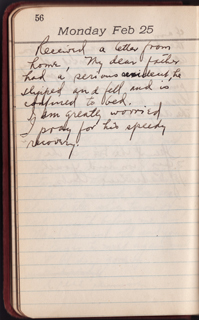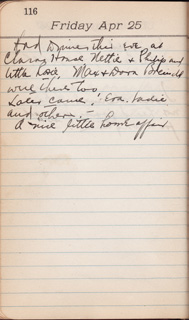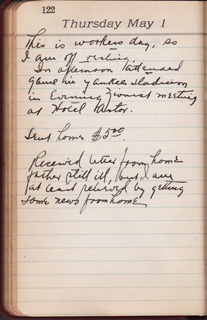
(above date) First day of Spring
proper to renew hopes
I am restless, if my
not for my radio which
kept me spellbound, in
the report round by round
of a championship boxing
fight at the Madison Square Garden
where at the End a new Jewish
champion was crowned,
I would not [be able to] stand my
loneliness. —
Just at this time I am
thinking of the 20th C. girl.
Before long I expect to have
the pleasure of her company
at an opera performance.
Received a letter from home
(parents) father still ill, May
the next letter bring me the news
of his speedy recovery.
——————
Matt’s Notes
The boxing match Papa listened to while he pined for the 20th Century Girl was a bantamweight bout in which Abe Goldstein, the challenger, took the title from defending champ Joe Lynch in a 12-round decision. According to the New York Times, Goldstein was “a product of the Ninety-second Street Y.M.H.A. and a graduate of the fistic nursery over which Nat Osk, Y.M.H.A. athletic instructor, reigns.” This refers to the very 92nd St. Y known today for its upscale guest lectures (“In Conversation: The Nimoys on Collecting”) and adult education programs (“Healthy, Wealthy & Wise: Life After 50”) so it’s a little hard to picture it as a hotbed of pugilism.
Yet so it was. Abe Goldstein was one of the many Jews who, hoping to box their way out of the ghetto, came to dominate the sport in the 1920’s. In Papa’s day, more New York boxers were Jewish than Irish or Italian, and Jewish gym owners, promoters and trainers also “assumed disproportionately prominent roles in all aspects of the sport”.1 In fact, when Goldstein left the Y for Grupp’s Gymnasium on 116th Street in Harlem, he came under the wing of the great Jewish trainer Ray Arcel, a Stuyvesant High School grad who trained 20 world champions including Kid Gavilan, Roberto Duran and Larry Holmes. The owner of Grupp’s was apparently such an anti-Semite that Arcel and his charges picked up and took their act to the little-known, Jewish-owned Stillman’s Gym on 125th street, after which it grew into one of boxing’s legendary gyms.2
Jewish boxers usually wore Stars of David on their robes and trunks and rarely tried to pass for gentile, though their attitudes varied as to whether they were fighting on behalf of the Jewish people or just doing their jobs3. Papa had no such ambivalence, though. Like many Jewish immigrants who had experienced European anti-Semitism firsthand, Papa took pride in his fighting landsmen and other “muscle Jews” who refused to appear stereotypically weak and cowed. Remember, he nicknamed the chapter of the mutual aid society he belonged to “The Maccabeans” after the Jewish warriors of old, so living, breathing Jewish athletes (who probably lived across the alley from him) must have filled him with more than garden-variety ethnic pride.
Alas, no one — not “Slapsie” Maxie Rosenblum, Benny Leonard, or Ray Arcel himself — could have shown Papa how to conquer his loneliness or beat the poverty that kept his ailing parents in the old country. We’ve seen before how milestones made him especially contemplative and melancholy, and though the arrival of Spring was “proper to renew hopes,” I’m not sure he felt genuinely hopeful. Stay tuned.
————-
References for this post:
———————
And here’s a 1922 Benny Leonard fight via YouTube:
————–
Our friend J.R. adds:
For what it’s worth, Abe Goldstein’s first fight was on June 30, 1916, in New York, New York – he knocked out George Lewis in the 8th round. On August 4th, he defeated Kid Rago, and on August 26, he made quick work of a boxer who went by the name Smiling Willie. From what I can tell, the names of his competitors grew more and more comical as he went along culminating in successive and, one would assume, heartbreaking losses in 1925 to Bushy Graham in New York, and Dixie LaHood in Butte, Montana. (Even the names of the towns he fought in got funnier if you read them wrong!)
He was considered to be among the top five bantemweights of all time… presumably by some guy who was familiar with at least five bantemweights.














